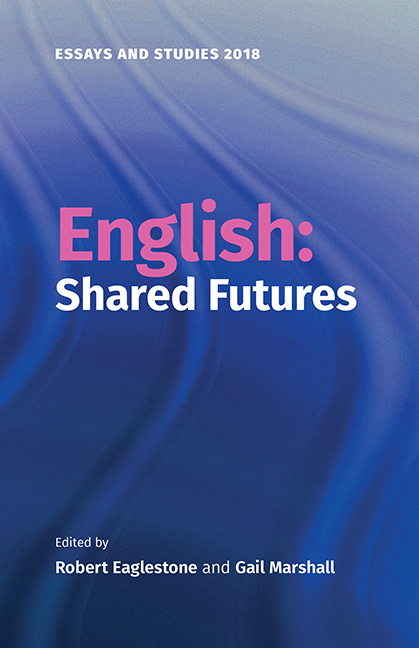Book contents
- Frontmatter
- Contents
- Notes on Contributors
- Acknowledgements
- Abbreviations
- Introduction
- The Changing Picture of School English
- From A-Level to HE: Working Towards a Shared Future?
- English Outreach: Academics in the Classroom
- From Provider to Stager: The Future of Teaching English in HE
- Pedagogic Criticism: An Introduction
- Exquisite Tensions – Narrating the BAME ECA Experience
- Postgraduate Futures: Voices and Views
- Shared Futures: Early Career Academics in English Studies
- Some Reflections on the Funding of English Departments
- English: The Future of Publishing
- Digital Futures
- A View from the United States: The Crisis in the Humanities; the Liberal Arts; and English in the Military Academy
- The Future of Borders
- ‘Between and Across Languages’: Writing in Scotland and Wales
- Exploring Intersections between Creative and Critical Writing: An Interview with Elleke Boehmer
- Integrating English
- Employability in English Studies
- Creative Living: How Creative Writing Courses Help to Prepare for Life-long Careers
- Practice at Large: How Creative Writing can Enhance University Research Environments
- ‘And who can turn away?’ Witnessing a Shared Dystopia
- English and the Public Good
- ‘Can Wisdom be put in a silver rod? / Or Love in a golden bowl?’ On Not Defending the Humanities
- ‘Something Real to Carry Home When Day Is Done’: The Reader in Future
- Afterword
- Index
Pedagogic Criticism: An Introduction
Published online by Cambridge University Press: 15 October 2019
- Frontmatter
- Contents
- Notes on Contributors
- Acknowledgements
- Abbreviations
- Introduction
- The Changing Picture of School English
- From A-Level to HE: Working Towards a Shared Future?
- English Outreach: Academics in the Classroom
- From Provider to Stager: The Future of Teaching English in HE
- Pedagogic Criticism: An Introduction
- Exquisite Tensions – Narrating the BAME ECA Experience
- Postgraduate Futures: Voices and Views
- Shared Futures: Early Career Academics in English Studies
- Some Reflections on the Funding of English Departments
- English: The Future of Publishing
- Digital Futures
- A View from the United States: The Crisis in the Humanities; the Liberal Arts; and English in the Military Academy
- The Future of Borders
- ‘Between and Across Languages’: Writing in Scotland and Wales
- Exploring Intersections between Creative and Critical Writing: An Interview with Elleke Boehmer
- Integrating English
- Employability in English Studies
- Creative Living: How Creative Writing Courses Help to Prepare for Life-long Careers
- Practice at Large: How Creative Writing can Enhance University Research Environments
- ‘And who can turn away?’ Witnessing a Shared Dystopia
- English and the Public Good
- ‘Can Wisdom be put in a silver rod? / Or Love in a golden bowl?’ On Not Defending the Humanities
- ‘Something Real to Carry Home When Day Is Done’: The Reader in Future
- Afterword
- Index
Summary
Pedagogic criticism involves reading texts through teaching, and teaching through texts. In so doing its aim is to bring into focus the transactions between the study and interpretation of texts and the social forms and rituals of pedagogy. It is a way of articulating a process through which an educational subject is talked into being. Literary studies is a form of cultural production, a collaborative process of making, carried out through a specialised form of dialogue: this form of conversation starts with what may look like confusion and moves towards a provisional order. Thus critical discourse – an intensified version of the meta-linguistic and interpretative conversations that constitute social living – is fashioned in the teaching relationship. Reciprocally, texts frequently prefigure the acts of pedagogy and politics of interpretation.
In exploring this interaction, pedagogic criticism borrows a leaf from New Historicism. Arguing that social energy is stored in literature not only in paper form, but in ongoing social exchange and transactions, Stephen Greenblatt proposes that ‘we begin by taking seriously the collective production of literary pleasure and interest’. In pedagogic criticism I attempt to re-submerge printed criticism in the oral pedagogic dialogues from which it has emerged, reading the history of the discipline as a history of practices as much as a history of ideas. While so much of pedagogy obeys invisible rules, this approach seeks to locate and listen to pedagogic voices within a discipline whose history can best be understood as being a history of practices as much as of the evolution of ‘subject knowledge’ arguing for a kind of isomorphism between the tropes of text and those of pedagogy.
The thick description of the discipline draws heavily on the work of the UK English Subject Centre between 2001 and 2011.2 The subject ‘English’ (in both secondary and tertiary education), while subject to enormous and in many ways conflicting political and social pressures, may be at a moment of radical reformation from within. Pedagogic criticism seeks to contribute to that transformation by raising the level of visibility of largely unspoken assumptions about teaching and learning. Education is a formal process for enlarging the repertoire of individual and social choices: pedagogic criticism suggests that the study of literary and cultural texts is a potent stage for the development of ideas about learning – ideas that are frequently at odds with the ‘evidence-based’ shibboleths that dominate current educational policy.
- Type
- Chapter
- Information
- English: Shared Futures , pp. 40 - 50Publisher: Boydell & BrewerPrint publication year: 2018

